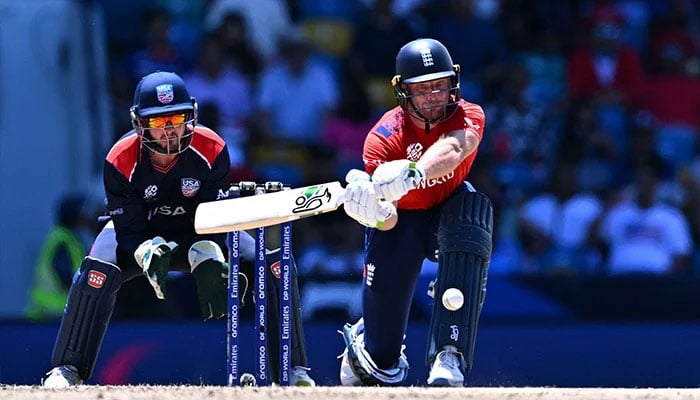T20 World Cup 2024: Defending champion England first team to move to semi-finals
Chris Jordan performed a hat-trick, picking up four wickets in one over to bowl out the US within 19 overs
BRIDGETOWN, Caribbean Islands: Defending champions England become the first team to march into the T20 World Cup 2024 semi-finals with a 10-wicket cakewalk against the US at the Kingston Oval Sunday.
Set to achieve win in less than 15 overs to go through ahead of other Pool 2 teams. Joss Buttler (83 not out) led the run chase with breezy knock studded with seven sixes and six fours to achieve the target in 9.4 overs. Together with Phil Salt (25), Buttler made sure England reach the winning score well ahead of the given target.
Earlier, Chris Jordan performed a hat-trick, picking up four wickets in one over to bowl out the US within 19 overs.
He removed Ali Khan, Nasthush Kenjegi and Saurabh Netravalkar on three successive deliveries. He had the US skipper Corey Anderson (29) earlier in the over. The US lost their last five batsmen within six deliveries without the addition of a single run. From 115 for 5, the US were bowled out at the same score six balls later.
Besides, Anderson, Natish Kumar (29) and Harmeet Singh (21) played well. Besides Jordan, Man of the Match Adil Rasheed (2-13) was brilliant in the middle overs keeping a tight check on the US scoring rate.
“There was something on the wicket. My wrong one went well today. Now we are waiting as to who we are to play in the semis,” Adil Rashid said.
Score: USA all out 115 all out in 18.5 overs (Nitish Kumar 30, Core Anderson 29, Chris Jordan 4-10, Adil Rashid 2-13, Sam Curran 2-23)
England 117 for no loss in 9.2 overs (Jose Buttler 83 not out, Phil Salt 25 not out).
-
 AI Copyright Battle: ByteDance To Curb Seedance 2.0 Amid Disney Lawsuit Warning
AI Copyright Battle: ByteDance To Curb Seedance 2.0 Amid Disney Lawsuit Warning -
 Savannah Guthrie In Tears As She Makes Desperate Plea To Mom's Kidnappers
Savannah Guthrie In Tears As She Makes Desperate Plea To Mom's Kidnappers -
 Canada’s Defence Industrial Strategy Targets 125,000 Jobs And Export Growth
Canada’s Defence Industrial Strategy Targets 125,000 Jobs And Export Growth -
 Tre Johnson, Former NFL Guard And Teacher, Passes Away At 54
Tre Johnson, Former NFL Guard And Teacher, Passes Away At 54 -
 Jerome Tang Calls Out Team After Embarrassing Home Defeat
Jerome Tang Calls Out Team After Embarrassing Home Defeat -
 Cynthia Erivo Addresses Bizarre Rumour About Her Relationship With Ariana Grande
Cynthia Erivo Addresses Bizarre Rumour About Her Relationship With Ariana Grande -
 Prince Harry, Meghan Markle Spotted Cosying Up At NBA All-Star Game
Prince Harry, Meghan Markle Spotted Cosying Up At NBA All-Star Game -
 Lady Gaga Explains How Fibromyalgia Lets Her 'connect With People Who Have It'
Lady Gaga Explains How Fibromyalgia Lets Her 'connect With People Who Have It' -
 Metro Detroit Weather Forecast: Is The Polar Vortex Coming Back?
Metro Detroit Weather Forecast: Is The Polar Vortex Coming Back? -
 Daniel Radcliffe Reveals Surprising Way Fatherhood Changed Him
Daniel Radcliffe Reveals Surprising Way Fatherhood Changed Him -
 ‘Disgraced’ Andrew At Risk Of Breaking Point As Epstein Scandal Continues
‘Disgraced’ Andrew At Risk Of Breaking Point As Epstein Scandal Continues -
 Alan Cumming Shares Plans With 2026 Bafta Film Awards
Alan Cumming Shares Plans With 2026 Bafta Film Awards -
 OpenClaw Founder Peter Steinberger Hired By OpenAI As AI Agent Race Heats Up
OpenClaw Founder Peter Steinberger Hired By OpenAI As AI Agent Race Heats Up -
 Kate Middleton's Reaction To Harry Stepping Back From Royal Duties Laid Bare
Kate Middleton's Reaction To Harry Stepping Back From Royal Duties Laid Bare -
 Rose Byrne Continues Winning Streak After Golden Globe Awards Victory
Rose Byrne Continues Winning Streak After Golden Globe Awards Victory -
 Ice Hockey Olympics Update: Canada Stays Unbeaten With Dominant Win Over France
Ice Hockey Olympics Update: Canada Stays Unbeaten With Dominant Win Over France




